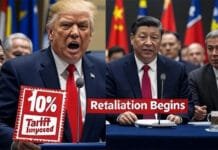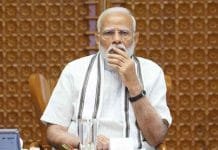In a landmark moment during the BRICS summit in Brazil, Prime Minister Narendra Modi emphasized the need for global cooperation on Artificial Intelligence and announced that India will host the AI Impact Summit next year. Speaking at the high-level session focused on “Strengthening Multilateralism, Economic-Financial Affairs and Artificial Intelligence,” the Prime Minister issued a clarion call for responsible AI development, transparency, and global content authenticity standards.
India Leads the Charge on Responsible AI Development
PM Modi, representing one of the fastest-growing digital economies, underlined India’s commitment to “AI for All.” He highlighted that India is not just talking about AI but actively implementing it across diverse sectors—agriculture, healthcare, education, and governance.
By leveraging AI at scale, India is setting an example of inclusive innovation, aiming to bridge the digital divide while enhancing public service delivery. From AI-powered crop yield predictions to diagnostics in rural clinics and automated language translation in government portals, India’s approach is holistic and people-centric.
AI Impact Summit 2026: India’s Strategic Tech Diplomacy
To increase international coordination, PM Modi declared the AI Impact Summit will be held in India next year. This initiative marks a pivotal step toward shaping global AI norms and ensuring that ethical frameworks are not just regionally confined but globally adopted.
The Summit is expected to host global leaders, tech innovators, academic institutions, and AI ethicists to discuss:
Standardization of digital content verification
AI governance frameworks
Ethical AI innovations
Collaborative R&D opportunities
India aims to foster consensus on critical issues such as algorithmic bias, data privacy, AI weaponization, and the misuse of synthetic media. The event will also provide a platform to initiate global AI certification protocols, potentially serving as the foundation for the world’s first AI authenticity standards.
Global Standards for Digital Content Authenticity
A major highlight of PM Modi’s address was the urgent need to verify the authenticity of digital content. In a world increasingly influenced by deepfakes and misinformation, he called for universal standards that can trace the origin and credibility of digital assets.
Such mechanisms would enhance transparency, build trust in digital ecosystems, and prevent the malicious misuse of AI-generated content. Modi’s proposal indicates India’s willingness to lead the global debate on content provenance, thereby aligning technological advancement with democratic values.
Safeguarding Critical Minerals and Tech Supply Chains
Another key focus of PM Modi’s address was the strategic management of critical minerals and technology. He warned against their use for narrow geo-economic or political gains, stressing that these should not become tools of coercion or profit monopolies.
In light of the increasing global race for lithium, cobalt, and rare earth elements—essential for semiconductors, electric vehicles, and AI hardware—Modi proposed a multilateral cooperation model to ensure:
Fair and resilient global supply chains
Equitable access to strategic resources
Collective mitigation of resource nationalism
This approach reflects India’s broader vision for technological sovereignty, sustainable development, and de-weaponizing global trade dependencies.
Strengthening Multilateralism in the Age of AI
With the world order under pressure, from climate challenges to geopolitical tensions, PM Modi reiterated the need to reimagine multilateralism. He suggested that BRICS can evolve as a catalyst for a multipolar and balanced global order—a world where no single nation dictates technological norms or economic priorities.
The Prime Minister underscored BRICS’ growing strategic and economic relevance in today’s world. In a multipolar world order, emerging powers like India, Brazil, South Africa, Russia, and China must collaborate more closely to set inclusive and future-ready agendas.
India’s AI Ecosystem: A Global Case Study
India’s AI ecosystem is rapidly maturing, backed by strong governmental support, a vibrant startup scene, and significant investments in cloud infrastructure, machine learning, and open-source AI platforms. Initiatives like Digital India, National AI Portal, Bhashini, and IndiaAI are fostering grassroots-level AI adoption.
The AI for Youth program is training thousands of students in AI basics, ensuring early literacy in disruptive technologies. With collaborations from private tech giants and open datasets from government projects, India is creating a unique AI innovation sandbox that is both ethical and scalable.
Call for Equitable AI Governance
PM Modi emphasized that as AI becomes central to governance, it is critical to ensure fair access and non-discriminatory algorithms. He advocated for dual-priority governance—one that promotes AI innovation but also safeguards human rights, privacy, and civil liberties.
He stated that developing nations must have an equal voice in setting the rules of this new era. To that end, India is committed to democratizing access to AI tools and platforms, ensuring no country is left behind in the fourth industrial revolution.
AI as a Bridge, Not a Barrier
India’s vision of “AI for All” stands in contrast to models that view AI as a proprietary advantage. PM Modi’s insistence on shared technological progress reinforces the idea that AI should serve as a bridge across cultures and economies, not as a wedge dividing them.
He noted that AI must empower humanity, not replace it. In a world where automation often leads to displacement anxiety, India is investing in reskilling, digital literacy, and human-AI collaboration frameworks.
India’s Message to Global Powers
Sending a strong message to technologically advanced nations, PM Modi urged them to avoid turning critical technologies and minerals into political weapons. Instead, he called for a just and inclusive AI economy where trust, transparency, and accountability are the bedrock.
He advocated for ethical sourcing, environmentally conscious mining, and technology diplomacy rooted in fairness rather than dominance. His remarks serve as a diplomatic reminder that tech nationalism and resource protectionism are threats to global peace and progress.
Conclusion: BRICS as the Torchbearer of the Future
The BRICS summit in Brazil marked a significant milestone in redefining global digital cooperation, with India at the helm of advocating responsible AI, equitable technology sharing, and a multilateral order built on trust.
With the upcoming AI Impact Summit in India, the country positions itself as a global thought leader in tech ethics, digital governance, and inclusive AI ecosystems. As nations prepare for unprecedented disruptions and opportunities, India’s voice at BRICS will continue to shape the future of international collaboration in the AI era.
















